
SmarTrip is a contactless stored-value smart card payment system managed by the Washington Metropolitan Area Transit Authority (WMATA). The Maryland Transit Administration (MTA) uses a compatible payment system called CharmCard. A reciprocity agreement between the MTA and WMATA allows either card to be used for travel on any of the participating transit systems in the Baltimore-Washington metropolitan area. Unlike traditional paper farecards or bus passes, SmarTrip/CharmCard is designed to be permanent and reloadable; the term "SmarTrip" may refer to both payment systems unless otherwise noted.
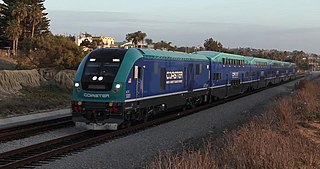
Coaster is a commuter rail service in the central and northern coastal regions of San Diego County, California, United States, operated by the North County Transit District (NCTD).

The San Diego Trolley is a light rail system operating in the metropolitan area of San Diego. The trolley's operator, San Diego Trolley, Inc., is a subsidiary of the San Diego Metropolitan Transit System (MTS). The trolley operates as a critical component of the MTS, with connections to and integrated travel tickets with the local bus systems.
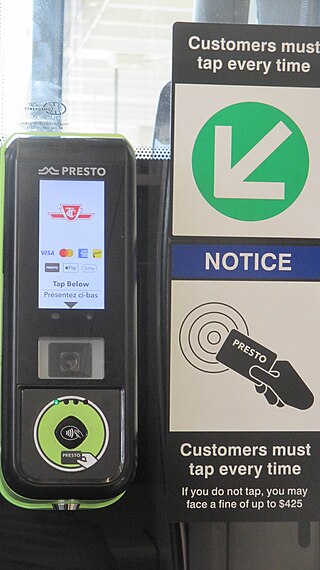
Fares to use the Toronto Transit Commission (TTC) transit system in Toronto, Ontario, Canada, can be paid with various media. The price of fares varies according to age, occupation, income level, and health condition of riders.
The San Diego Association of Governments (SANDAG) is an association of local San Diego County governments. It is the metropolitan planning organization for the county, with policy makers consisting of mayors, councilmembers, and county supervisors, and also has capital planning and fare setting powers for the county's transit systems, the San Diego Metropolitan Transit System and North County Transit District, some of which was assumed by the Metropolitan Transit Development Board.
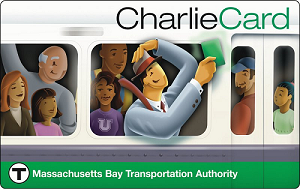
The CharlieCard is a contactless smart card used for fare payment for transportation in the Boston area. It is the primary payment method for the Massachusetts Bay Transportation Authority (MBTA) and several regional public transport systems in the U.S. state of Massachusetts. It is used on the MBTA's subway and bus services, but is not currently accepted on the MBTA Commuter Rail and ferries.

Proof-of-payment(POP) or proof-of-fare(POF) is an honor-based fare collection system used on many public transportation systems. Instead of checking each passenger as they enter a fare control zone, passengers are required to carry a paper ticket, transit pass, transit smartcard - or open payment methods such as contactless credit or debit cards (if applicable) - after swiping or tapping on smart card readers, to prove that they have paid the valid fare. Fares are enforced via random spot-checks by inspectors such as conductors or enforcement officers, to ensure that passengers have paid their fares and are not committing fare evasion. On many systems, a passenger can purchase a single-use ticket or multi-use pass at any time in advance, but must insert the ticket or pass into a validation machine immediately before use. Validation machines in stations or on board vehicles time stamp the ticket. The ticket is then valid for some period of time after the stamped time.
The Chicago Card and the Chicago Card Plus were contactless smart cards used by riders of the Chicago Transit Authority (CTA) and Pace to electronically pay for bus and train fares in the city of Chicago, Illinois, USA and the surrounding suburbs. On June 1, 2014, CTA and Pace stopped accepting these cards as part of a transition to Ventra.

Sprinter is a hybrid rail service operating in the North County area of San Diego County between the cities of Escondido and Oceanside, California, United States. The service uses the 22-mile (35 km) Escondido Subdivision of the San Diego Northern Railroad. Station platforms were constructed for the line's fifteen stations serving the cities of Oceanside, Vista, San Marcos, and Escondido. The line provides service to California State University, San Marcos and Palomar College. Sprinter service operates every 30 minutes and is targeted towards students and commuters.
The North County Transit District (NCTD) is the agency responsible for public transportation in Northern San Diego County, California. The agency manages the COASTER commuter rail service between Oceanside and San Diego, the SPRINTER hybrid rail service between Escondido and Oceanside, the BREEZE transit bus service, LIFT paratransit service, and FLEX on-demand and point-deviation service.

The following is a list of transportation options in San Diego County, California.

The ORCA card is a contactless, stored-value smart card system for public transit in the Puget Sound region of Washington, United States. The card is valid on most transit systems in the Seattle metropolitan area, including Sound Transit, local bus agencies, Washington State Ferries, the King County Water Taxi, and Kitsap Fast Ferries. It was launched in 2009 and is managed by the Central Puget Sound Regional Fare Coordination Project, a board composed of local transit agencies.
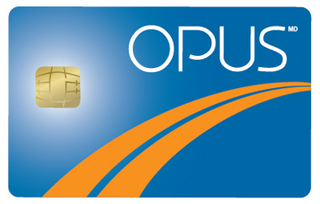
Opus is a rechargeable, dual interface (contact/contactless) stored-value smart card using the Calypso Standard and is used by major public transit operators in Greater Montreal and Quebec City, Quebec, Canada. It complies with the ISO/IEC 14443 standard for smartcards and can be read by smartphones with an NFC antenna.

The Transit Access Pass (TAP) is a contactless smart card used for automated fare collection on most public transport agencies within Los Angeles County, California. The card is also available in electronic form, free of charge, in Apple Wallet, thereby bypassing the need to purchase the plastic USD $2 card. It is administered by the Los Angeles County Metropolitan Transportation Authority (Metro), and the card and fare collection systems are manufactured by Cubic Transportation Systems.
A fare is the fee paid by a passenger for use of a public transport system: rail, bus, taxi, etc. In the case of air transport, the term airfare is often used. Fare structure is the system set up to determine how much is to be paid by various passengers using a transit vehicle at any given time. A linked trip is a trip from the origin to the destination on the transit system. Even if a passenger must make several transfers during a journey, the trip is counted as one linked trip on the system.
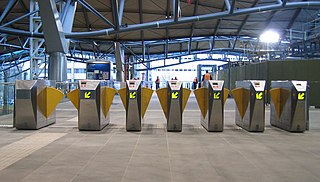
An automated fare collection (AFC) system is the collection of components that automate the ticketing system of a public transportation network – an automated version of manual fare collection. An AFC system is usually the basis for integrated ticketing.

The Compass card is a contactless smart card automated fare collection system used primarily for public transit in Metro Vancouver, British Columbia, Canada. Compass card readers were first implemented as a beta in September 2013. Due to delays, full implementation to the general public began in August 2015. The system is operated by Cubic Transportation Systems and is managed by TransLink, the transportation authority for the region.
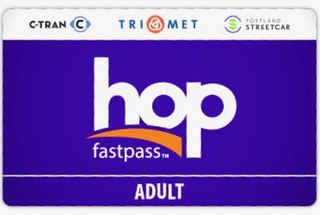
Hop Fastpass is a contactless smart card for public transit fare payment on most transit modes in the Portland, Oregon, metropolitan area including MAX Light Rail, WES commuter rail, Portland Streetcar, The Vine, and all TriMet and C-TRAN buses. An initial release to the general public began on July 5, 2017, with the official launch on July 17. The program is managed by TriMet.
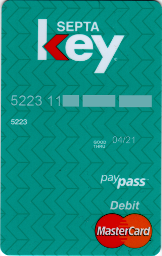
The SEPTA Key card is a smart card that is used for automated fare collection on the SEPTA public transportation network in the Philadelphia metropolitan area. It can be used throughout SEPTA's transit system, including buses and SEPTA Metro, and on Regional Rail.

Pronto is the contactless payment system for automated fare collection on public transit services in San Diego County, California. The system is managed by the San Diego Metropolitan Transit System, operated by INIT Systems, and is valid on all services operated by the Metropolitan Transit System, and on the North County Transit District.
























